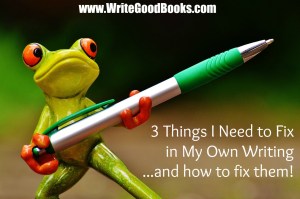 You’re probably thinking, “Only three? Who are you kidding?”
You’re probably thinking, “Only three? Who are you kidding?”
Rest assured, there are probably hundreds of things I need to fix. But in this post, I’d like to discuss the three most pressing, at least as I see them.
Poor Descriptions
I think I’m pretty good at writing action and dialogue. The problem is that I overdo it. It could be safe to say that in a typical story, 3/4 of it is made up of action and dialogue. This can be a huge problem, especially when the writing needs to slow down to a novel pace. When you need to create an entire world for a novel, it’s not going to be very deep if the novel is made up almost entirely of characters doing and saying things without any real narrative describing the setting.
This leads to the larger problem, however, which isn’t necessarily that there aren’t enough descriptions. It’s that the descriptions are poorly written. The trap I fall into is that if I need to describe something (say an object, person, or place) I’ll often catch myself listing irrelevant adjectives. A red car. A green house. The blue sky.
To fix: Make sure that when you see an object in your mind’s eye, it’s the same scene your character is seeing. Describe the noun from your character’s point of view and only include what’s necessary.
Interchangeable characters
I’m fine if I have a story with one or two main characters. The problem comes when I have five or six. In hopes to find a way to differentiate between the characters, I often fall back to the problem I have with descriptions: superficial traits. Blonde girl? Check. Athletic guy? Check. Intelligent loner? Check. Sometimes I feel like I’m writing the cast of the Power Rangers.
So once I realize I’m doing that, I try giving the characters some kind of personality trait to separate them. But where does that get you? If you’re not careful, it’s the cast of a generic slasher film. The joker, the slut, the jock, and the virgin are still just a group of cardboard characters if the traits you give them don’t matter.
To fix: Take the time to create a character profile for each character. Give them hopes, dreams, likes, dislikes. After you write your story, strip out all the dialogue tags and randomly pick some sentences. If you can’t tell who is talking, then your characters are still too interchangeable.
Rushing to the finish line
I don’t always do well when I plot out a story ahead of time. In no way do I want to criticize those who do, but for me, it usually doesn’t work. I need to create the story as I write, otherwise I just feel like I’m writing a book report. The one drawback is that when I don’t have an ending in mind, it shows.
Sometimes the ending will come when I’m half-way through the story. That’s perfect, because I still create the story and figure out how to get to the end. The problem is when I can’t seem to get there at all. I’ve got plenty of stories that should fit in the 3000-3500 word range, but then suddenly are 5000-6000 words long and seem to be just hanging around without any direction as I figure out how to end them. Kind of like Lost.
There are three options at this point:
- Throw on an ending–any ending–just to get it done. Again, just like Lost. Terrible, but far too often, this is what I end up doing.
- Keep writing. Maybe your short story should be a novella. You might have to do some major cleanup, but by allowing yourself to keep writing, the story might get back on track.
- Don’t end the story at all. This is the worst possible option. Like Stephen King in Thinner or Cell, just end with a cliffhanger and annoy your reader.
To fix: This one is difficult. Mapping out your story in advance won’t always fix it if the ending you plan is still a bad ending. You might just get stuck when you’re writing the outline instead of when you’re writing the story. I guess I don’t really have a quick fix for this.
Sometimes the ending just has to write itself. If you end up stuck and just writing while you wait for and ending to come to you, just make sure that when you get there you do a good job in your first revision of making the rest of the story fit the ending. Build up to it and take out anything that isn’t necessary.
So there you have it. I’m the furthest thing from perfect (just ask, well, everyone who has ever met me) but these are three things in my writing that I can work on fixing. What are yours?







